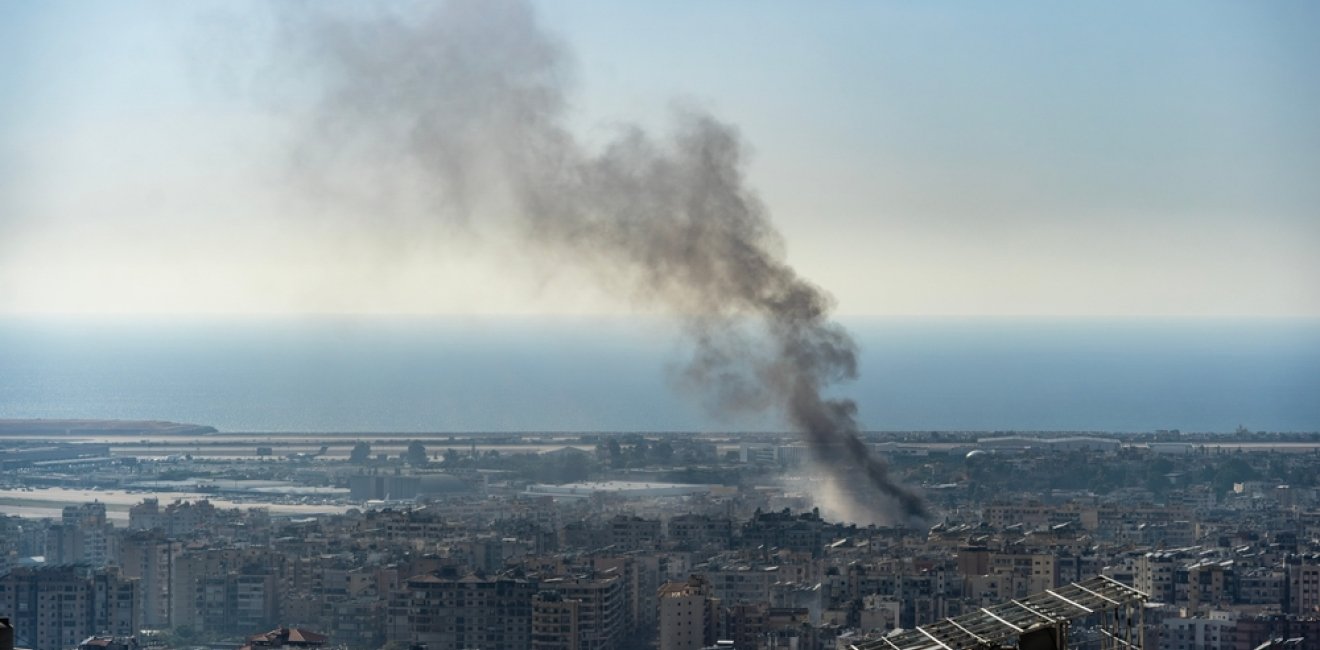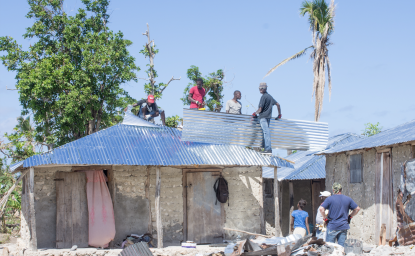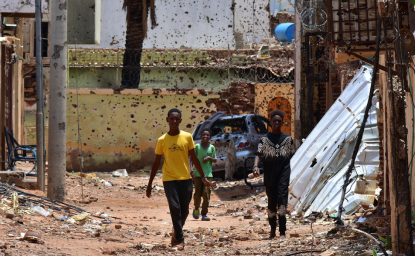The cross-border exchanges between Israel and Hezbollah that began more than a year ago have escalated into a full-scale war, the intensity of which Lebanon has never seen before. Immediate response efforts are ongoing, but the long-term needs of Lebanon’s population, economy, and infrastructure will take decades to address.
Lebanon heavily depends on food imports, with around 80% of the consumer’s food basket being imported. Local production is not sufficient to meet the population's needs, and the war on Lebanon, which targets local farming, farmers, and international trade routes, is likely to propel around 1.26 million people to high levels of food insecurity. Additionally, the war also compounds health, education, and human capital crises that may take decades to solve.
Destruction of agriculture and infrastructure
Agricultural land has been targeted in Bekaa and South Lebanon, rendering it deserted and potentially toxic. Since October, white phosphorus, a highly flammable chemical weapon, has destroyed around 1,910 hectares of forests, agricultural land, and vital crops such as olive trees, thyme, grapes, and other vegetables. In areas where white phosphorus has not been reported, the continual Israeli bombardment of villages in the South and Bekaa has led many farmers to abandon their land and livestock. Without access to their lands, many farmers will be impoverished, further compounding their ability to purchase food and other necessities. The decline in local production will exacerbate the availability of key products in the market, rendering a greater portion of the population vulnerable to food insecurity and malnutrition.
Increasing imports could alleviate the situation, but the demand for foreign currency would hinder Lebanon’s economic recovery, deepening its dependence on foreign markets and further devaluing the Lebanese Pound (LBP). The war drives up foreign currency demand, raising import costs and limiting access to essential goods. Repeated attacks on border crossings disrupt supply chains and deepen this crisis, such as the recent one on Masnaa, as noted by Matthew Hollingworth, director of the UN's World Food Programme, “Goods that would normally come overland through that crossing—the cheapest, most effective way to bring commodities into that country—will also not be able to be received here.” The export of agricultural products will also decline, deepening Lebanon’s economic crisis.
Without the capacity to produce, import food, or generate income, Lebanon faces a looming crisis of food insecurity, malnutrition, and poverty, resulting in an increased reliance on humanitarian aid and foreign markets. This vicious cycle heightens inequality, limits economic growth, and perpetuates a state of dependency that hinders Lebanon's recovery and resilience.
For weeks, Israel has intensified its airstrikes in Lebanon, inflicting severe and widespread damage to infrastructure. In Beirut, entire residential units have been flattened to the ground, while villages in South Lebanon and Bekaa report extensive destruction of homes, roads, electrical grids, and water supply. As of May, the estimated damages in South Lebanon alone reached 1.5 billion USD; more recent estimates of Beirut and other regions remain limited due to the ongoing strikes they continue to witness. The roads surrounding the airport and between Lebanon and Syria have also witnessed significant damage, as have many local businesses.
Without international support, a large portion of the population will require prolonged financial assistance for temporary housing and lack access to essential services.
Without stability or liquidity—both absent due to Lebanon’s banking crisis—reconstruction efforts could face significant delays or become impossible. Unlike in 2006, Lebanon lacks its previous economic strength, and its people have little liquidity or access to capital. Without international support, a large portion of the population will require prolonged financial assistance for temporary housing and lack access to essential services.
Education and health in crisis
Lebanese residents have been forced to flee. Those with the means have evacuated to the European Union, Brazil, or Cyprus—brokering private yachts for upwards of $1,800 per person. Others, including Lebanese and Syrians, have opted to flee by car to Syria, with some now traveling on foot after the Masnaa Border Crossing was struck. Syrians face additional risks, including arrest and detention by the Syrian government, with at least nine cases already documented.
Those who remain face the psychological and emotional strain of displacement, having lost their homes, livelihoods, and social linkages.
Those who remain face the psychological and emotional strain of displacement, having lost their homes, livelihoods, and social linkages. Schools, community centers, and religious sites have been repurposed as shelters to house the estimated 1.2 million people, many of whom now struggle to meet basic needs like food, shelter, and psychosocial support. Overcrowded shelters force some to sleep on the streets. Marginalized groups, such as refugees and migrant workers under the Kafala system, face even greater risks, as many shelters prioritize Lebanese citizens. Vulnerable communities are left to rely on grassroots organizations like those mapped by the Anti-Racism Movement (ARM) for access to basic services, while others, like the LGBTQIA+ community, depend on civil society organizations like Helem for safe spaces.
As the war intensifies, residents in South Lebanon, Bekaa, and Beirut endure the terror of sonic booms, evacuation orders, and airstrikes that destroy neighborhoods. The psychological toll is immense, with rising cases of insomnia, anxiety, and depression. Mia Atoui, founder of the mental health charity Embrace, described the situation as 'ongoing, continuous PTSD,' worsened by recent crises. Even before this conflict, Embrace’s waiting lists for mental health services stretched up to five months. While organizations like Embrace, Himaya, and Medecins Sans Frontieres are working to provide essential psychosocial support across the country, the scale of the crisis far exceeds available resources.
An educational crisis is also looming as the academic year is pushed back due to ongoing attacks, displacement, and the use of public schools as shelters. According to the Government Emergency Committee, 77% of public schools are being used and cannot provide educational services. The Minister of Education announced a plan for re-opening schools, with hybrid or online modalities being an option. However, the inefficient telecom infrastructure, coupled with the extensive trauma children have witnessed, makes it difficult to envision a “normal” school day.
Extensive exposure to traumatic events can exacerbate symptoms of PTSD and challenge children’s ability to develop emotional regulation and coping mechanisms. A generation of students is also at risk of falling behind in their education, severely compounding students’ ability to develop critical skills and integrate into a changing job market.
Similarly, Lebanon’s health sector was already under immense strain due to a mass exodus of health workers driven by the economic crisis and port explosion. With multiple specialties lacking in Lebanon, the increased Israeli hostilities have created an unprecedented need for trauma and specialized care, with infectious diseases, amputations, and burns from chemical weapons being increasingly reported. Specialties such as “emergency medicine, resuscitation, and anesthesia” are lacking in emergency rooms, said Head of the Lebanese Syndicate of Physicians, Professor Youssef Bakhash, urging Lebanese doctors abroad to return home and contribute.
The crisis is exacerbated by a dire shortage of medical equipment. Lebanese Embassies around the world have issued urgent appeals for medical equipment, underscoring the pressure of the situation. The increasing attacks on medical facilities and personnel also risk Lebanon’s ability to respond to any future health crisis. At the time of writing, 102 paramedics and health workers have been killed, 225 injured, 45 medical centers, nine hospitals, and 128 first responder vehicles have been damaged, and six have either fully or partially stopped operating. First responders are also increasingly anxious that they will be targeted. Israel has threatened local response teams attempting to enter attack sites in Beirut and has launched multiple attacks on the Red Cross, civil defense vehicles, and aid trucks. If first responders are no longer able to respond, the injuries sustained by the victims will be further aggravated, leading to additional complications or death.
Long term implications
At the time of writing, 2,412 people have been killed, many requiring DNA identification, and 11,285 have sustained injuries from Israeli assaults. The long-term implications of this crisis are profound. Many have lost limbs and eyes or were subjected to severe burns, impairing their ability to function independently. With the absence of adequate rehabilitation programs, specialized services, and economic opportunities, the victims will require further financial assistance from the state or other actors. Burn victims will likely grapple with severe psychological trauma, affecting their mental health and quality of life for years to come.
Recovery for Lebanon's health sector, once viewed as a regional hub for medical treatment, will potentially take years, if not decades. There must be concerted efforts to create adequate emergency plans for health crises of this scale, including training of medical personnel and stockpiling essential supplies. In addition, Lebanon must incentivize the return of health workers, as their expertise will be crucial for restoring the country’s medical capabilities and ensuring the long-term well-being of its population.
With over one million displaced and extensive damages reported, essential sectors—such as health, education, and human capital—are at risk.
The war’s impact extends far beyond the immediate devastation, threatening to compound Lebanon’s existing crisis. With over one million displaced and extensive damages reported, essential sectors—such as health, education, and human capital—are at risk. Without an immediate ceasefire and equitable resource mobilization, Lebanon risks a protracted crisis, deepening inequalities and weakening its social and economic fabric. Mitigating the devastating impacts on multiple sectors will require significant investment, both locally and internationally, along with systemic reforms to address the needs of vulnerable groups and enhance planning for future crises.
The views represented in this piece are those of the authors and do not express the official position of the Wilson Center.






